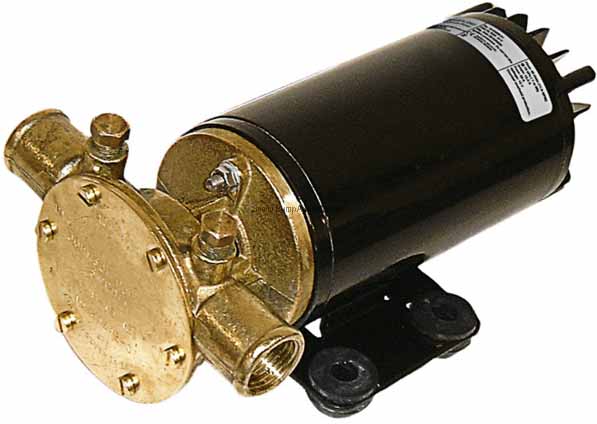Johnson # F4B-19-12V Bronze Rubber Impeller Pump and Motor

Johnson # F4B-19-12V
Johnson catalog # F4B-19-12V, Bronze Flexible Impeller Pump and Motor unit, Bronze construction, Nitrile impeller. Motor is 12 Volts DC. Inlet Port is 1 inch hose and 1/2 inch NPT, Discharge Port is 1 inch hose and 1/2 inch NPT.
Price : $ 384.18
Product Information :
The Johnson F4B-19-12V is a Bronze Flexible Impeller Pump and Motor unit with Nitrile Impeller, 1 inch hose and 1/2 inch BSP by 1 inch hose and 1/2 inch BSP Ports, coupled to a 12 Volt DC Motor. This bronze pump is corrosion resistant, is constructed from marine quality bronze and stainless steel for ruggedness and reliability, and features a stainless steel shaft. Other features of this pump are a convenient carrying handle, a motor shaft slinger to protect the motor bearings, and rubber motor grommets for noise isolation. This Pump has one moving part - a tough, long-lived, wear-resistant flexible impeller lubricated by the liquid being pumped. No metal-to-metal pumping action - no gears to jam, clog or become noisy. These pumps are designed to be fully serviceable and after long use can be restored to like new condition, avoiding complete pump replacement. The impeller and cam are easily replaced. The Flexible Impeller in this pump generates high rubbing friction unless lubricated by the liquid being pumped. A lack of liquid will cause the impeller to degrade rapidly. Motor drive is clockwise facing pump end, and the liquid flow direction is right to left facing pump end. The correct D.C. voltage must be supplied to motor - 12 volts DC as specified on the motor name plate. On initial start-up pump must be primed to prevent dry-running of the impeller. This pump is self-priming, and will self-prime at low or high speeds. It will pump instantly, and a suction lift of 10 feet is possible when impeller is wet and pump fully primed. Suction lines must be air tight in order for pump to self prime. A foot valve at the beginning of suction line is recommended.
WEIGHT : The Johnson F4B-19-12V weighs 7.5 Lbs. Lbs.
Features :
Applications
Typical Applications for the F4B1912V pump are pumping liquids that are compatible with the Nitrile impeller such as fresh and salt water solutions and mild chemicals. Marine uses include Bilge, Washdown, Baitwell and General Transfer. Do not pump gasoline, severe solvents or acids. When possible flush pump with fresh water after each usage. Nitrile impellers can handle oil contaminated water and kerosene, although it will reduce impeller service life. Extremes of cold and heat will affect impeller life. Limits of 40 degrees F to 140 degrees F should be maintained. Do not allow liquid in pump to freeze, and when not in use for long periods of time you can drain pump by removing drain plug provided, located at bottom of pump body. Use methyl alcohol based antifreeze compounds such as Zerex, Shell Sone, Pyro Permanent, Permagard, Dowgard. This flexible impeller pump can operate in either rotational direction. It combines the priming feature of positive displacement type pumps with the general transfer ability of centrifugal pumps. It will pump either thin or viscous liquids and can handle more solids in suspension than other types of rotary pumps. It operates at low or high speeds can be mounted at any angle and pumps in either direction with equal efficiency. Direction of shaft rotation determines inlet and outlet ports. Prior to installation, rotate the pump manually in direction of rotation to set flexible blades in direction desired.
The impeller must be replaced if it is worn out or has been damaged by debris or by running the pump dry. Symptoms of a defective impeller are low pumping pressure and low flow. To replace the impeller remove screws and cover. Pull out the impeller with nose pliers or two screwdrivers. Be careful not to dent the pumping chamber with these tools. When inserting new impeller, line up key slot in impeller with the key in the shaft. Use oil on shaft and avoid forcing the impeller onto the shaft. The impeller should also be removed for storage periods to prevent the blades from taking a permanent set.
If water drips from the area where the shaft exits the pump, the seal is defective and must be replaced. While the shaft slinger barrier seal provides a first line of defense, prolonged running of the pump with a leaky seal can destroy the ball bearings of the electric motor. For seal replacement, the pump must be removed from the motor and disassembled in order to gain access to the seal area. The Buna seal must be pushed out of the pressfitted position and a new lip seal pressed into place, using a sealant on the outside of the lip seal housing.